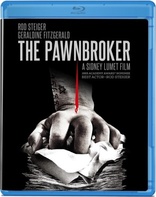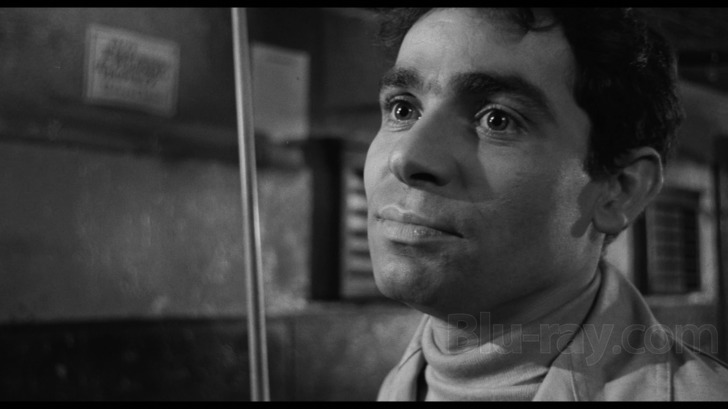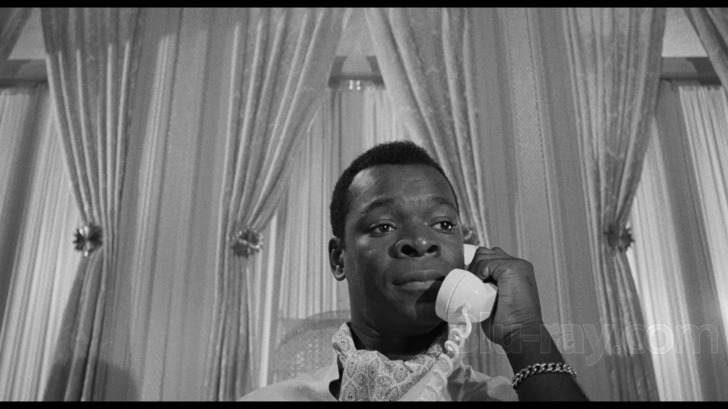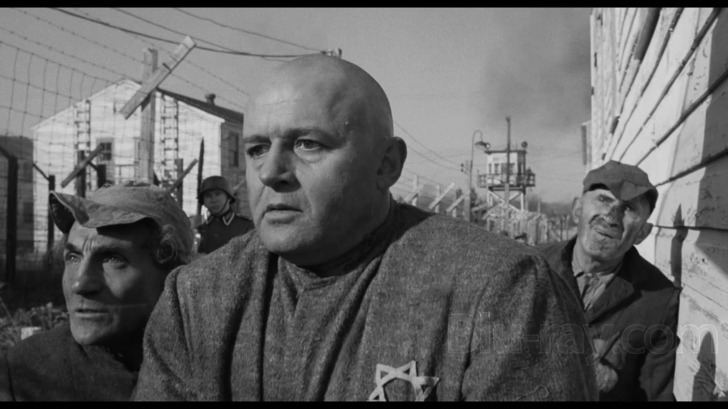The Pawnbroker Blu-ray Movie
HomeThe Pawnbroker Blu-ray Movie 
Olive Films | 1964 | 116 min | Not rated | Apr 22, 2014
Movie rating
7.6 | / 10 |
Blu-ray rating
| Users | 4.5 | |
| Reviewer | 4.0 | |
| Overall | 4.0 |
Overview
The Pawnbroker (1964)
Rod Steiger (IN THE HEAT OF THE NIGHT) earned a Best Actor Oscar nomination for his stunning performance in this powerful story of hope and empathy from celebrated director Sidney Lumet (DOG DAY AFTERNOON). Steiger plays Sol Nazerman, a survivor of a WWII Nazi death camp where his wife, parents and children were murdered. His soul robbed of hope, he takes refuge in misery and a bitter condemnation of humanity while managing a Harlem pawnshop subjected to an endless parade of prostitutes, pimps and thieves. Jamie Sanchez (THE WILD BUNCH) plays Ortiz, Sol's underprivileged and idealistic assistant who dreams of a better life. Two of the film's best features are the gorgeous black and white cinematography by the great Boris Kaufman (ON THE WATERFRONT) with a memorable trumpet score by the legendary Quincy Jones (THE GETAWAY). The wonderful cast also includes Geraldine Fitzgerald (WUTHERING HEIGHTS), Brock Peters (TO KILL A MOCKINGBIRD) and Raymond St. Jacques (COTTON COMES TO HARLEM).
Starring: Rod Steiger, Geraldine Fitzgerald (I), Brock Peters, Jaime Sánchez, Baruch LumetDirector: Sidney Lumet
| Drama | 100% |
Specifications
Video
Video codec: MPEG-4 AVC
Video resolution: 1080p
Aspect ratio: 1.85:1
Original aspect ratio: 1.85:1
Audio
English: DTS-HD Master Audio Mono
Subtitles
None
Discs
50GB Blu-ray Disc
Single disc (1 BD)
Playback
Region A (locked)
Review
Rating summary
| Movie | 4.5 | |
| Video | 4.5 | |
| Audio | 4.0 | |
| Extras | 0.0 | |
| Overall | 4.0 |
The Pawnbroker Blu-ray Movie Review
Survivor: Harlem.
Reviewed by Jeffrey Kauffman March 18, 2014Survivor’s guilt is certainly among the stranger psychological phenomena that confront human beings. Given our almost primal genetic imperative to endure at virtually any cost, it would seem counterintuitive that we would be anything other than celebratory should we somehow escape the grasp of impending death, even if only for a moment. And yet, those who have managed to weather some immense trauma while seeing others perish are often confronted with incredibly deep, almost unfathomable, psychological scars that penetrate every waking moment and haunt their dreams. Part of this is no doubt due to what we perceive as the absolutely random nature of such events, wherein some people manage to come out “the other side” to live to fight another day, while others expire despite having no less desire to stay alive. These roiling emotions are at the forefront throughout 1964’s acclaimed drama The Pawnbroker, a film which was not just controversial but downright notorious in its day (for reasons that seem positively provincial to modern day eyes), but which remains iconic for having been one of the first (some would argue the first) major film to confront the horrors of the Holocaust head on. The Pawnbroker is an often dour, depressing film, as probably befits its subject matter, a penetrating though at times circumspect examination of one Sol Nazerman (Rod Steiger, in an Academy Award nominated performance), a Jew who saw his family decimated in concentration camps and who has tried—not very successfully—to stitch together his post-War life by operating a pawn shop in East Harlem, a struggling neighborhood that reminds Nazerman of the Jewish Ghettos of the pre-War and wartime eras. Nazerman has learned to cope—if only barely—by completely shutting down his emotions. He is curt, unresponsive and at times barely verbal as he doles out a dollar or two for the largely worthless trinkets various neighborhood residents bring into him in an effort to stave off financial disaster for another day, mortgaging what in many cases are precious memories for some cold, hard cash.

Director Sidney Lumet offers a neat visual analog for the persistence of memory by having the film actually start with a (frankly somewhat hackneyed) flashback to a halcyon summer day Sol spent with his wife, two young children and other family members out in the countryside, a picnic of sorts that is interrupted by an unseen though obviously implied terror. More convincing perhaps is Lumet’s repeated use of very quick snippets of flashbacks which interrupt the main, contemporarily based, narrative flow of Sol’s life in New York. Sol is besieged by visions of various degradations suffered by his family, and Sol himself, which are very briefly intercut throughout the film, delivering a palpably visceral depiction of Sol’s fractured state of mind.
Sol has completely shut down on an emotional level, though it appears that the pawn business he manages is doing quite well, for Sol is able to support the family of his dead wife’s sister, who live in relative luxury on Long Island, as well as Tessie (Marketa Kimbrell), the widow of a concentration camp prisoner whom Sol watch die a horrific death during the war. Despite Sol’s emotional distance, he’s looked up to by a number of the neighborhood residents, as well as by his assistant, Jesus Ortiz (Jaime Sánchez), who rather remarkably seems to idolize Sol and wishes to learn all about the ins and outs of the pawn business from the old man.
Meanwhile a woman named Marilyn Birchfield (Geraldine Fitzgerald) shows up at the shop one day looking for a donation to a neighborhood youth group she’s helping, becoming perhaps unwisely interested in Sol in the process. Marilyn does not wilt before Sol’s often brusque demeanor, though she perhaps inconsiderately tries to equate what Sol has lived through with her more mundane memories of typical childhood traumas which she weathered years ago. Things begin to grow even darker for Sol when it’s revealed that the pawn shop is actually just a front for a gangster named Rodriguez (Brock Peters), who is laundering money through the facility and is not about to suffer Sol’s pangs of conscience gracefully. A bunch of neighborhood toughs (including one played by Raymond St. Jacques) tease Jesus one night when he’s out with his girlfriend (Thelma Oliver), making the defensive young man indiscreetly mention that Sol has a large amount of cash in his safe.
Things come to a head when Rodriguez starts putting the screws to Sol, leading him to confess to Marilyn that for the first time in years he’s actually feeling something—fear. In the meantime, Sol’s repeatedly cold responses to Jesus result in the boy joining with the toughs to plan a robbery of Sol’s stash of cash. The film ends up being a rather disturbing indictment of how far a wounded psyche will go to insulate itself from an unpredictable world, though the ending can be seen as at least potentially ambivalent.
The Pawnbroker raised some perhaps unexpected hackles when it was released, for reasons at least partially removed from its subject matter. In one especially emotionally brutal scene, Jesus’ girlfriend tries to scrape together some bucks by stripping in front of Sol, offering herself to the elderly man. Sol, who repeatedly is plagued by memories sparked by what’s he’s currently experiencing, drifts into a horrifying remembrance of female Jews being forced into sex with their German captors, females which included his now dead wife. Lumet intercuts two scenes of full frontal nudity on the part of Thelma Oliver (who would soon be playing a “dance hall girl” in the Broadway musical Sweet Charity) and Linda Geiser. It’s a deliberately provocative sequence which still manages to jolt even cynical modern day viewers; it’s probably hard to calculate how shocking it must have been in 1964.
The film is anchored by an absolutely titanic performance by Rod Steiger. Rather unbelievably, Lumet (who himself was not the first choice to direct the film) wasn’t convinced Steiger could pull off the role, suggesting that Steiger had questionable taste in his acting decisions. It’s hard to fault any of Steiger's choices in The Pawnbroker, however. He’s prickly, off putting but (especially in a couple of key sequences) achingly vulnerable. Lumet’s direction is surprisingly flashy at times, perhaps a sign of a still maturing master finding an appropriate style to convey this anguished tale. The montage theory Lumet employs with editor Ralph Rosenblum is arguably the film’s strongest stylistic element, but other choices, like a point of view shot from a lawnmower that Raymond St. Jacques wheels into the shop to pawn tend to jar (and may unfortunately remind horror fans of similar scenes in films like Peter Jackson’s early effort Dead Alive).
Does Sol finally, albeit tragically, reconnect with his emotions at the close of The Pawnbroker? An extremely unsettling act of self immolation (a none too subtle crucifixion reference) might suggest that he’s still struggling to make himself feel, or at the very least to physically punish himself for not feeling. One of my earliest memories as a child was being introduced to relatives and family friends who had survived the Holocaust, some of them with those horrifying tattoos burnt into their arms (and their souls), being told by my parents in no uncertain terms that I was not to ask any questions. There was a perhaps understandable urge in the wake of World War II to bury the past, or at least to attempt to. The Pawnbroker viscerally displays the perils in and indeed even the ultimate impossibility of pursuing that tactic.
The Pawnbroker Blu-ray Movie, Video Quality 

The Pawnbroker is presented on Blu-ray courtesy of Olive Films with an AVC encoded 1080p transfer in 1.85:1. Aside from a very few minor issues, including transitory issues like miniscule specks and even an occasional hair in the gate, this is a virtually flawless transfer that beautifully reproduces Boris Kaufman's rain drenched location photography which makes the upper reaches of Manhattan a fetid, drenched character itself. (How Kaufman failed to receive an Academy Award nomination is one of the bigger mysteries of mid-century Oscar contests, especially since the Academy was still honoring black and white films separately from color films). Contrast is exceptionally strong, delivering Kaufman's gorgeously modulated gray scale and the deep, almost menacing, shadows of the pawnshop with no loss of shadow detail. Lumet and Kaufman utilize extreme close-ups quite a bit of the time, and those reveal superb fine detail. There's quite a bit of mobile location work here, and that tends to look somewhat softer than the bulk of the film, but that can be attributed to the shooting conditions and source elements rather than to any flaw in the transfer itself. As with virtually every Olive release, there is no sign of digital interference here; grain structure is fully intact and organic looking, and there are no distractions like haloing or other signs of digital sharpening.
The Pawnbroker Blu-ray Movie, Audio Quality 

The Pawnbroker's lossless DTS-HD Master Audio Mono track offers a clear accounting of the dialogue as well as Quincy Jones' at times rather anachronistic score. Now I am a huge Jones fan, and in fact gave a rave review to the new audio Blu-ray of Quincy Jones: Big Band Bossa Nova, an album whose iconic tune "Soul Bossa Nova" is utilized in The Pawnbroker as a source cue during a love scene, but Jones' big band jazz approach to the film seems deliberately at odds with the film's emotional tenor. It certainly captures the manic intensity of New York, but (for me, anyway) it often fails to convey the deep anguish of the film. (I've often wished someone like David Amram had scored this film.) All of this said, the track itself is clean and offers excellent fidelity, and there is no damage to report.
The Pawnbroker Blu-ray Movie, Special Features and Extras 

No supplements are offered on this Blu-ray disc.
The Pawnbroker Blu-ray Movie, Overall Score and Recommendation 

The Pawnbroker is a stifling, almost suffocating, film experience, one which delivers a virtually "first person" account of what living through the horrors of the Holocaust wrought on one individual. This is not an easy film to watch, but it offers a devastating portrayal of a man desperately attempting to evade his memories, and finding himself trapped by them all the more. Steiger has never been better, and the film has a gritty, grimy ambience that perfectly captures mid-century Manhattan in all its shabby glory. This Olive release offers superior video and excellent audio. While supplements certainly would have been preferable, this release comes Highly recommended.
Similar titles
Similar titles you might also like

Mammoth
2009

Birds of Passage
Pájaros de verano
2018

The Rider
2017

A Touch of Sin
天注定 / Tian zhu ding
2013

Factory Girl
2006

Fail Safe
1964

Something Wild
1961

The Damned
La caduta degli dei
1969

Pasolini
2014

The Look of Silence
2014

A Child Is Waiting
1963

Way Down East
1920

Chop Shop
2007

Detachment
2011

Phaedra
1962

Where Is Kyra?
Beat-up Little Seagull / Kyra
2017

La Chienne
The Bitch
1931

The Fire Within
Le feu follet
1963

City of Life and Death
南京!南京! / Nanjing! Nanjing!
2009

The Insect Woman
にっぽん昆虫記 / Nippon konchûki
1963